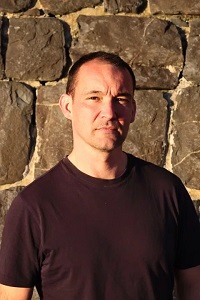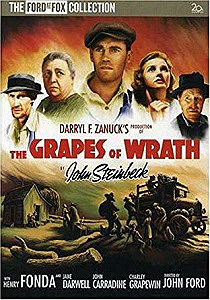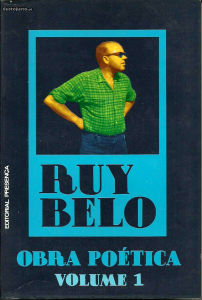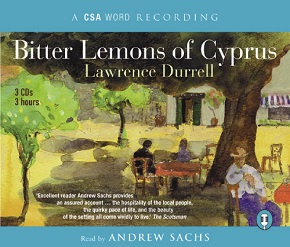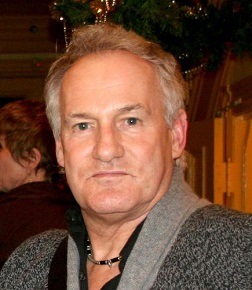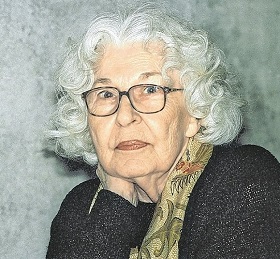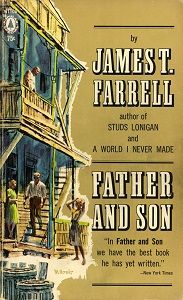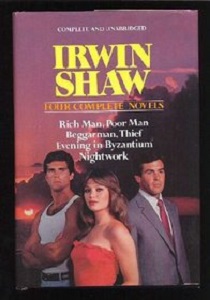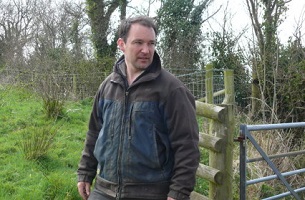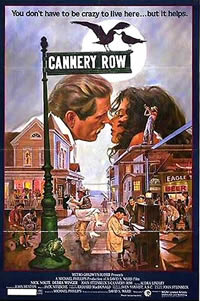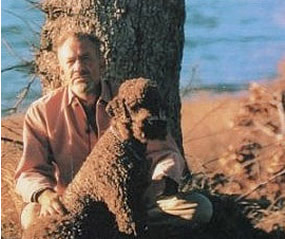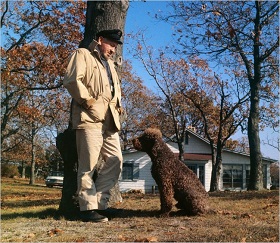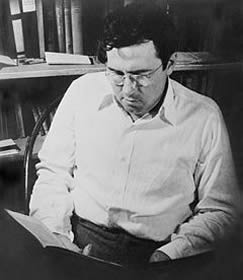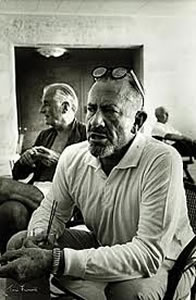De Amerikaanse schrijver John Steinbeck werd geboren in Salinas, Californië, op 27 februari 1902. Zie ook mijn blog van 27 februari 2007 en ook mijn blog van 27 februari 2008 en ook mijn blog van 27 februari 2009.
Uit: Of Mice and Men
“A few miles south of Soledad, the Salinas River drops in close to the hillside bank and runs deep and green. The water is warm too, for it has slipped twinkling over the yellow sands in the sunlight before reaching the narrow pool. On one side of the river the golden foothill slopes curve up to the strong and rocky Gabilan mountains, but on the valley side the water is lined with trees—willows fresh and green with every spring, carrying in their lower leaf junctures the debris of the winter’s flooding; and sycamores with mottled, white, recumbent limbs and branches that arch over the pool. On the sandy bank under the trees the leaves lie deep and so crisp that a lizard makes a great skittering if he runs among them. Rabbits come out of the brush to sit on the sand in the evening, and the damp flats are covered with the night tracks of ’coons, and with the spread pads of dogs from the ranches, and with the split-wedge tracks of deer that come to drink in the dark.
There is a path through the willows and among the sycamores, a path beaten hard by boys coming down from the ranches to swim in the deep pool, and beaten hard by tramps who come wearily down from the highway in the evening to jungleup near water. In front of the low horizontal limb of a giant sycamore there is an ash pile made by many fires; the limb is worn smooth by men who have sat on it.
Evening of a hot day started the little wind to moving among the leaves. The shade climbed up the hills toward the top. On the sand banks the rabbits sat as quietly as little gray, sculptured stones. And then from the direction of the state highway came the sound of footsteps on crisp sycamore leaves. The rabbits hurried noiselessly for cover. A stilted heron labored up into the air and pounded down river. For a moment the place was lifeless, and then two men emerged from the path and came into the opening by the green pool.”
John Steinbeck (27 februari 1902 – 20 december 1968)
Standbeeld in Monterey
De Canadese dichter, schrijver en essayist André Roy werd geboren op 27 februari 1944 in Montréal. Hij studeerde Frans en is werkzaam als docent en literair criticus. Het bekendst is zijn cyclus „Passions“, bestaande uit Les passions du Samedi (1979), Petit supplément aux passions (1980); en Monsieur Désir (1981).
Un rien d’amour
Le ciel distribué dans le temps massif ;
L’oeil est un temple dans la nuit ;
L’air marche
Parce que chacun possède son propre corps.
Pourquoi je rêve comme une bête
Quand tu n’es pas là ?
Je rêvais que tu rêvais dans mes songes,
Que tu étais heureux comme en enfer.
Il existe quatre lois pour la passion :
Avant, pendant, après, jamais.
Les étoiles digérées par ton corps
Deviennent des animaux dans tes yeux.
Ta passion veux que tu saignes,
Que tu puisses te pardonner de nous aimer.
The Muscles and Body Hairs
Melted in the mouth, colour hanging
A pink tool, but for now let”s talk
Of the ripple of his muscles (see how time
Is upset at a glance, the clock in
Slow motion) attuned to his technique, I exclaim
His body hairs briefly summing them up
In those cerain young spots that make me
Abandon all discretion now I’m summing up
Since at that time I was still coming.
Pleasure and Desire, Knowing and Wanting
knowing fatal pleasure, or very chemical,
so stupendously they I don’t dare write the word
they ejaculated but don’t fix me foor good
in those virile snapshots
despite their nervousness and the conversation that
helped I understand this will to tenderness,
the irritated look on their gorgeous faces
(“Your face is as cute as a love-word”)
because that swiftness, that suavity and
because desire has already scored you, teeth sweat,
the happenings that resist or that have disa
ppeared
too soon, but no zeal, no shame in admitting it.
Vertaald door Daniel Sloate
André Roy (Montréal, 27 februari 1944)
De Britse dichter en schrijver Lawrence George Durrell werd geboren op 27 februari 1912 in Jalandhar in India. Zie ook mijn blog van 27 februari 2007 en ook mijn blog van 27 februari 2008 en ook mijn blog van 27 februari 2009.
Delos
For Diana Gould
On charts they fall like lace,
Islands consuming in a sea
Born dense with its own blue:
And like repairing mirrors holding up
Small towns and trees and rivers
To the still air, the lovely air:
From the clear side of springing Time,
In clement places where the windmills ride,
Turning over grey springs in Mykonos,
In shadows with a gesture of content.
The statues of the dead here
Embark on sunlight, sealed
Each in her model with the sightless eyes:
The modest stones of Greeks,
Who gravely interrupted death by pleasure.
And in harbours softly fallen
The liver-coloured sails –
Sharp-featured brigantines with eyes –
Ride in reception so like women:
The pathetic faculty of girls
To register and utter desire
In the arms of men upon the new-mown waters,
Follow the wind, with their long shining keels
Aimed across Delos at a star.
This Unimportant Morning
This unimportant morning
Something goes singing where
The capes turn over on their sides
And the warm Adriatic rides
Her blue and sun washing
At the edge of the world and its brilliant cliffs.
Day rings in the higher airs
Pure with cicadas, and sl
owing
Like a pulse to smoke from farms,
Extinguished in the exhausted earth,
Unclenching like a fist and going.
Trees fume, cool, pour – and overflowing
Unstretch the feathers of birds and shake
Carpets from windows, brush with dew
The up-and-doing: and young lovers now
Their little resurrections make.
And now lightly to kiss all whom sleep
Stitched up – and wake, my darling, wake.
The impatient Boatman has been waiting
Under the house, his long oars folded up
Like wings in waiting on the darkling lake.

Lawrence Durrell (27 februari 1912 – 7 november 1990)
De Amerikaanse dichter Henry Wadsworth Longfellow werd geboren in Portland, Maine, op 27 februari 1807. Zie ook mijn blog van 27 februari 2007 en ook mijn blog van 27 februari 2008 en ook mijn blog van 27 februari 2009.
Hymn to the Night
I heard the trailing garments of the Night
Sweep through her marble halls!
I saw her sable skirts all fringed with light
From the celestial walls!
I felt her presence, by its spell of might,
Stoop o’er me from above;
The calm, majestic presence of the Night,
As of the one I love.
I heard the sounds of sorrow and delight,
The manifold, soft chimes,
That fill the haunted chambers of the Night
Like some old poet’s rhymes.
From the cool cisterns of the midnight air
My spirit drank repose;
The fountain of perpetual peace flows there,–
From those deep cisterns flows.
O holy Night! from thee I learn to bear
What man has borne before!
Thou layest thy finger on the lips of Care,
And they complain no more.
Peace! Peace! Orestes-like I breathe this prayer!
Descend with broad-winged flight,
The welcome, the thrice-prayed for, the most fair,
The best-beloved Night!
Henry Longfellow (27 februari 1807 – 24 maart 1882)
De Duitse schrijfster en dichteres Elisabeth Borchers werd geboren in Homberg op 27 februari 1926. Zie ook mijn blog van 27 februari 2007 en ook mijn blog van 27 februari 2008 en ook mijn blog van 27 februari 2009.
November
Es kommt eine Zeit,
da lassen die Bäume
ihre Blätter fallen.
Die Häuser rücken
enger zusammen.
Aus dem Schornstein
kommt ein Rauch.
Es kommt eine Zeit,
da werden die Tage klein
und die Nächte groß,
und jeder Abend
hat einen schönen Namen.
Einer heißt Hänsel und Gretel.
Einer heißt Schneewittchen.
Einer heißt Rumpelstilzchen.
Einer heißt Katherlieschen.
Einer heißt Hans im Glück.
Einer heißt Sterntaler.
Dezember
Es kommt eine Zeit
da wird es still
Da gehn die Lichter aus
da kommt ein Wind
ruft nach dem Fährmann
Der träumt den Traum
vom goldnen Schiff
Das Schiff hat eine
große Fahrt bei Nacht
Es geht von Haus zu Haus
Es fährt die Straßen auf und ab
Es kommt durch alle Länder
Es kommt durch alle Stuben
Da bleibt ein goldner Schein zurück
Elisabeth Borchers (Homberg, 27 februari 1926)
De Amerikaanse schrijver Irwin Shaw werd geboren op 27 februari 1913 als Irwin Gilbert Shamforoff in New York. Zie ook mijn blog van 27 februari 2009.
Uit: The Girls In Their Summer Dresses
„‘Sure,’ he said. He took his eyes off the hatless girl with the dark hair, cut dancer-style, like a helmet, who was walking past him with the self-conscious strength and grace dancers have. She was walking without a coat and she looked very solid and strong and her belly was flat, like a boy’s, under her skirt, and her hips swung boldly because she was a dancer and also because she knew Michael was looking at her. She smiled a little to herself as she went past and Michael noticed all these things before he looked back at his wife. ‘Sure,’ he said, ‘we’re going to watch the Giants and we’re going to eat steak and we’re going to see a French picture. How do you like that?’
‘That’s it,’ Frances said flatly. ‘That’s the program for the day. Or maybe you’d just rather walk up and down Fifth Avenue.’
‘You always look at other women,’ Frances said. ‘At every damn woman in the city of New York.’
‘Oh, come now,’ Michael said, pretending to joke. ‘Only pretty ones. And, after all, how many pretty women are there in New York? Seventeen?’
‘More. At least you seem to think so. Wherever you go.’
‘Not the truth. Occasionally, maybe, I look at a woman as she passes. In the street. I admit, perhaps in the street I look at a woman once in a while….’
‘Everywhere,’ Frances said. ‘Every damned place we go. Restaurants, subways, theaters, lectures, concerts.’
‘Now, darling,’ Michael said. ‘I look at everything. God gave me eyes and I look at women and men and subway excavations and moving pictures and the little flowers of the field. I casually inspect the universe.’
‘You ought to see the look in your eye,’ Frances said, ‘as you casually inspect the universe on Fifth Avenue.’
‘I’m a happily married man.’ Michael pressed her elbow tenderly, knowing what he was doing. ‘Example for the whole twentieth century, Mr. and Mrs. Mike Loomis.’
‘You mean it?’
‘Frances, baby….’
‘Are you really happily married?’
‘Sure,’ Michael said, feeling the whole Sunday morning sinking like lead inside him. ‘Now what the hell is the sense in talking like that?’
‘I would like to know.’ Frances walked faster now, looking straight ahead, her face showing nothing, which was the way she always managed it when she was arguing or feeling bad.“

Irwin Shaw (27 februari 1913 – 16 mei 1984)
Zie voor nog meer schrijvers van de 27e februari ook mijn vorige blog van vandaag.



